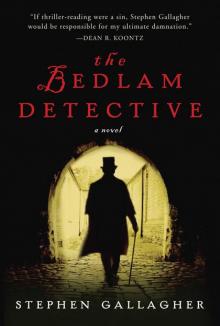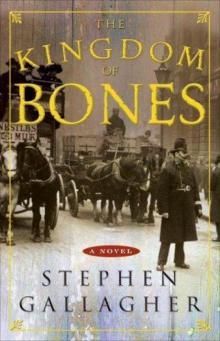- Home
- Stephen Gallagher
The Bedlam Detective Page 29
The Bedlam Detective Read online
Page 29
“Sir Owain,” he said, and saw no response. Sebastian nudged him with his foot and spoke his name again.
The man was showing all signs of life, other than consciousness. His color was good, his breathing steady. But nothing Sebastian did seemed to rouse him.
He went back downstairs and found his way to the study, thinking that he might reconnect the telephone. But the study was locked, too, and there was no point in trying to break in. Two inches of oak and a brass lock. He’d seen less substantial doors on bank vaults.
So then Sebastian went back and searched the entire entrance hall, as best he could. Sir Owain had come straight upstairs after speaking to his driver on the doorstep, so the key had to be somewhere within reach. But Sebastian couldn’t find it.
He looked into the kitchen. Dr. Sibley’s body was gone, and the mess had been cleaned up. The cement floor was dry. The woodwork shone, the copper gleamed. It had occurred to Sebastian that something was different about the house, and there it was: its general air of shabbiness had somehow receded during the night, like the lines of age falling away. When he turned to look back along the corridor behind him, he saw more of the same. The rug was fresh, its colors bright. The paneling was newly polished. He could smell the beeswax.
He could almost imagine the place inhabited again, with the staff and family somewhere just out of sight. Was someone playing the piano?
He raced through to the drawing room, but no one was there. He must have imagined it. Correction: he surely had imagined it, because the great house was locked up tight and only he and Sir Owain were inside. He wasn’t sure of what he’d heard, or whether he’d actually heard anything at all. It was as if the thought of music had crossed his mind, and his senses had immediately conjured some momentary evidence in support of the notion.
There was the danger. He took a deep breath and steadied himself. This was some progressive effect from whatever intoxicant he’d been fed the night before. It had to be. He realized now that he dare not fully trust his senses.
There was no way out of the kitchen. An unlocked door led to some stairs and a basement scullery, but there was no way out of that, either.
Behind a concealed entrance in the library he found a billiard room with a full-sized table set ready for play. He even thought that he could smell the cigar smoke in the air. On the walls were caricature sketches of famous past visitors to the house, with one wall dominated by a painting of a sea engagement involving one of Sir Owain’s battleships. As he looked at it, the seas around the ships began to roll and the sky to darken. He quickly turned away.
As he made his way along a lower gallery, a great shadow slid along the wall before him, though there was nothing to cast it. Butterflies in cases began fluttering excitedly on their pins as he passed by.
He grew more desperate. From a fireplace in an alcove he took a cast-iron poker and walked holding it before him, like a sword. Poker in one hand, gun in the other. If any danger should arise to threaten him in this new, malleable, and shifting world that he’d been thrust into, he would be ready to take it on.
Sir Owain had made the Hall into a lunatic’s prison for him. But he’d be no man’s specimen.
Evangeline had run through the woods, along pathways and carriage drives that had been laid out for beauty and long overgrown, until she reached the twelve-foot wall that bounded the formal gardens. Her boots were wet and her skirts were torn. She started to follow the wall along, but it had been solidly built and had no breach. No matter, she thought, she could follow it to its end; but then the inadvisability of this occurred to her. All that Sir Owain’s man would need to do, if he were sufficiently recovered, would be to go to the place where the wall ended and wait for her there.
Hiding was not an option, so far from the world. She needed to get off the estate. But when she moved, sudden eruptions of game birds betrayed her position to anyone with the wit to observe them. The advantage that she’d gained was slowly being lost. She could not leave the immediate grounds unseen. Even if she were to manage it, there would be miles of open land still to cross. She needed some closer refuge. She made the decision to approach the house.
Sir Owain might be mad, but she knew now that he was not her tormentor, nor had he ever been. His concern was authentic, his sadness real. And though Dr. Sibley might be mean and his manner unpleasant, he surely would not turn her away without a hearing. There was a chance that they might not believe her. But if she could beg the use of the telephone, she was in no doubt that Stephen Reed would.
The formal gardens had been laid out at a time when there had been a fashion for all things Japanese. But this was Japan as the English saw it. Her climb to the house was through an unkempt fantasy garden of streams, grottoes, and thick stone pavilions all but buried in wild undergrowth. When she reached the back terrace behind the Hall, she hesitated. It was but a step out of hiding and a walk across the courtyard to the door. She saw no sign of life anywhere about the property, and heard no sound other than the steady filling and draining of the drinking trough provided for visiting horses and fed from some distant spring.
Evangeline waited as long as she dared. What finally induced her to break cover was the far-off sound of a car’s engine, down in the valley below the house. If Sir Owain’s man was searching for her in the car, then he couldn’t be watching for her here.
With relief, she emerged from hiding and started toward the doors. She was almost halfway across the courtyard when she heard him sprinting behind her.
She didn’t look back, but instantly broke into a run with the aim of reaching the door ahead of him. Alas, she did not. He caught her arm and spun her around, almost popping the joint in her shoulder. He had a disheveled, furious look to him. He tried to drag her across the courtyard and away from the house. She dug in her heels, and after a yard or so her feet shot from under her and she sat down hard.
It didn’t make him release her. But he couldn’t do anything with her, either. So he let go of her arm and hit her, aiming the flat of his hand at the side of her head, with Evangeline managing to deflect some of the blow as she threw her own hands up to cover her face.
“Where is it?” he said.
“What?”
“You know what I mean,” he said, and raised his hand to hit her again.
“I know!” she said quickly. “I know what you want.” She fumbled in her coat.
He held off from hitting her and leaned in close, breathing hard and making a low, tutting, hissing sound through his teeth that was like the impatient tic of an eager snake. When she had to switch sides, he followed her hand.
When he had the button, what then? He’d have one piece of necessary business left, the disposal of the witness.
“Here,” she said. Looking up at him, showing a face that was eager to please, Evangeline brought her hand out of her coat. He leaned forward as he saw the glint of metal in her hand. She looked away and rammed her suffragette pin all the way into his left eye.
It was nine-karat gold. With imitation amethyst, peridot, and seed pearls. Though for Sir Owain’s man, the important element was the two-inch steel pin that came at him ahead of the rest.
He screamed. Like a hare being torn by dogs. But he didn’t let go of her, and he didn’t fall. He clapped his hand over the damaged eye and went at her with redoubled fury. She’d expected to disable him but had only increased his rage to a degree that overcame all pain. He was cursing, calling her names, laying into her with one fist and then with both; she rolled over and made herself as small as she could and drew her arms up to protect her face, taking most of the punches on her back and feeling that her heart would burst in her chest at each jarring blow.
Then he stopped. She wanted to scramble away but she couldn’t move. He was rising to start kicking her now, she knew it. She wanted to call for help from the house, but he’d beaten the breath out of her.
Instead of receiving a kicking, she felt herself seized by the collar and hoisted into the air.
He was dragging her across the courtyard like an ungainly sackful of limbs, aiming with purpose for the horse trough. She realized his intention and tried to fight back. But he managed her easily, never letting her find her balance or gain a purchase on the ground.
She did not get a chance to take a breath. When they reached the trough he plunged her in headfirst and held her under. The shock was enormous. She tried to grip the rough edges of the trough and force herself back, but she hadn’t the strength. He was going to hold her down until she was fully subdued, or worse.
Evangeline let her hands fall from the edge. She stopped fighting and tried to relax. If she could deceive him into thinking that she’d lost consciousness while she still had a spark of it left, she might yet prevail.
Was that her plan? Or was she in fact merely clinging to hope while experiencing her life fading in reality? Some people said that drowning sailors experienced bliss, though how those people came by the knowledge, never having drowned nor spoken to anyone who had, she could not imagine. She felt no bliss, only panic and fear.
Her ruse was not working. She could not manage the necessary stillness. Once more she started to resist, but he’d taken the opportunity to force her farther under. She opened her eyes. The water was cold and foul and silty, swirling about her like Greenwich fog. She was there once more, on the terrace of the Trafalgar Inn, watching for Sebastian Becker’s boat as the ghost ships passed by. The heavens split, and it started to rain.
The rain was red. It fell slowly through the fog all around her, like hot cinders through half-frozen slush.
The smell should have warned him. There they stood, their heads fused, their arms around each other. Freaks out of their bottle. Their skin was soft and pliable and completely without color, much as he imagined those bamboo grubs to have been. Rank spirits of alcohol were pooling around their feet. Sebastian couldn’t work out what they wanted.
When he’d asked for their forgiveness, they hadn’t responded. So it wasn’t that.
The face they shared had no expression. All bent out of shape, it was like a reflection in an oily puddle. No clues there. But then one arm came up and beckoned, and the pair attempted an awkward turn. They didn’t lead him onward, for which he was grateful. The smell of their preservative almost overpowered him as he eased by them. Once past, he did not look back.
This corridor led to the conservatory. Along the walls hung more of Sir Owain’s sentimental art collection; pet dogs, girls in gardens, boats at sea. On a plinth stood a strange piece of marble. It was of a child wrapped in a thin shroud, a stone carver’s technical exercise with the child’s features showing through the folds in the cloth. From the corner of his eye he saw the stone child turning its head to watch him as he passed.
The conservatory opened out before him. A soaring structure in cast iron and glass, a temple of light and dense, humid air. Within it was contained an entire world in miniature, a jungle facsimile of palms, orchids, lianas, and ferns. A pathway wound through to its center. Sebastian’s heart was beating, faster and faster.
My dust would hear her and beat, had I lain for a century dead.
Elisabeth was waiting.
There she stood, her back toward him. She wore a plain high-collared blouse and a long, light dress the color of smoke. Not as he’d seen her last, in the somber luxury of a chapel of rest, but as in life, unharmed. She seemed not to be aware of his approach. Her head was tilted, as if listening to music.
As soon as he saw that, he heard the music too. He remembered another Sunday in Willow Grove Park, a trolley ride out of Philadelphia, with Sousa on the bandstand. He’d worn a suit and a straw boater. They’d been younger then and, had they only known it, very happy. It seemed to him that Elisabeth looked exactly as she had on that day.
It took him a surprising amount of courage to speak.
He said, “A woman once told me that a man who can dance is always going to be in demand.”
She didn’t look at him. But she showed no surprise. She’d known all along that he was there.
Reaching out to touch the dull, spiky flowers on the towering grasses that grew beneath the palms, she said, “A wise woman. What happened to her?”
“She left when I wasn’t looking.”
“That’s not your fault.”
“It feels that way.”
She let the drab petals trail through her fingers. “Did you know,” she said, “that when bamboo goes into flower, it flowers at the same time all over the world? No one can explain it. But somehow it knows.” And she started to move away.
“Wait,” he said. “Please.”
Elisabeth stopped. She looked at him then, with those large gray eyes he remembered so well.
“What?”
“I know it’s too much to ask,” he said. “And I know it can’t happen. But I so want you back.”
“Good-bye, Sebastian,” she said. “This hour must pass. It’s time to let me go.”
“Not yet,” he said. “Please. I don’t want to.”
“I know,” she said. “But you must do it anyway. For both of us.”
FIFTY-TWO
Sir Owain was awake and alert when Sebastian finally returned to the stairs landing and dropped back into his place on the floor beside him. The man didn’t seem to have much strength for rising, and didn’t try. But his manner was eager enough.
“Well,” he said, “did you see them? The monsters?”
Sebastian took a deep and heavy breath; when he let it go, it was as if a small measure of his pain was washed out of him with it.
“No,” he said. “Not monsters.”
“What, then?”
Sebastian looked down and made no reply. Sir Owain went on, “You’ve seen her. Haven’t you? You can see her too? I’ve always known she was out there. But she always runs from me. What did she say? Did she mention me at all?”
Sebastian looked at him then. He knew that Sir Owain was speaking of his own wife, not of Elisabeth. But he was willing to let Sir Owain believe that his were the only ghosts that haunted the premises.
He said, “What would you want her to say?”
“Don’t just tell me what you think I want to hear,” Sir Owain said. “Tell me honestly. Did she say if I can ever be forgiven?”
Sebastian hesitated, and considered his own experience. Then told him, “She said to let her go.”
“Let her go? She said that? What does it mean?”
“What do you want from her?” Sebastian said. “She can’t come back to you. Stop wondering when the pain will go. It won’t. It’s part of what she left you. You’ll have to learn to love it.”
“What about my son?”
“From what I know, your son is happy,” Sebastian said.
“Did he have a message for me?”
“I’m sure he wants you not to worry. You’ve suffered enough. Believe that he forgives you.”
Sir Owain lowered his head, and his shoulders began to shake with silent weeping. Sebastian had mixed feelings about the lie, but no conscience. What mattered, here? He had his own consolation, rooted in a new and very shaky faith; let Sir Owain now have his.
He put his hand on Sir Owain’s shoulder.
“It’s over,” he said. “Now, please. Where did you hide those keys? I need your telephone.”
The keys were in the hallway cabinet, the one that contained the warship model. The glass lid lifted, and the keys were inside one of the steamer’s funnels. Sir Owain unlocked the study door and reconnected the telephone, which took him no more than a minute.
Sebastian placed his call, and as he waited for a messenger to return with someone from the Sun Inn to speak to him, he became aware that Sir Owain was no longer standing in the doorway. He felt a twinge of alarm. Sir Owain was subdued now, but far from harmless. Dr. Hubert Sibley lay dead, somewhere hereabouts. That might not be enough to save the tinker, but it would remove Sir Owain from human society.
Dolly came to the telephone. Not Stephen Reed,
not Parish Constable Bill Turnbull, but the Sun Inn’s cook. She began to tell him that the two men were already on their way to Arnside Hall; they’d made a troubling discovery, but she did not know what it was. While she was still explaining, Sebastian heard a shout. It came from outside. Sir Owain must have taken the keys and opened the main door.
Sebastian heard, “Monster! Monster!” and then the sound of a gunshot, ferociously loud in the courtyard. “Oh, Lord,” he said. He abandoned the telephone and ran into the hallway, skidding when he hit the rug, but not stopping as he dived onward toward daylight and the open air.
Sebastian had once seen half of a man’s head blown clean off, gone from the eye sockets up.
Much the same thing had happened to Thomas Arnot, Sir Owain’s chauffeur, as he’d stood trying to drown a young woman at the horse trough. Only he didn’t seem to know it yet. His body was still standing, half turned toward Sir Owain. Sir Owain stood in the middle of the courtyard with his hunting rifle half lowered. Arnot, his brains gone, seemed perfectly capable of carrying on without them. He seemed about to release his victim and start a jerky walk toward his would-be executioner.
But then the pretense crumbled, and the chauffeur’s body fell. His legs gave way, and he slid to the ground like a rotten building falling into its own foundations. Sir Owain still held the rifle, but Sebastian had a more pressing concern. Arnot’s victim remained half submerged and had ceased to struggle.
The water in the trough was all befouled with blood and fragments of bone. Even after Sebastian had pulled her out of it and lowered her to the courtyard floor, her long hair streaming like a mermaid’s, it was several seconds before he recognized Evangeline. He froze in horror. She did not move, or breathe.
“Here,” Sir Owain said, thrusting the hunting rifle into Sebastian’s hands and shoving him aside. “Delay can be fatal.”
He moved with purpose. He rolled Evangeline to lie facedown and drew up one of her arms so that her forehead could rest upon it, keeping her head clear of the ground. He placed his hands against the small of her back and pressed on it, in a more thorough version of the technique he’d used to keep Sebastian alive. Water streamed from Evangeline’s nose and mouth, as if squeezed from a goatskin. She showed no discomfort, or even awareness. Though she drew in breath when Sir Owain removed his weight from her, she gave no voluntary sign of life at all. Sir Owain repeated the action, again and again, the abdominal pressure forcing her diaphragm upward to act upon her lungs.

 The Boat House
The Boat House The Bedlam Detective
The Bedlam Detective Valley of lights
Valley of lights The Kingdom of Bones
The Kingdom of Bones